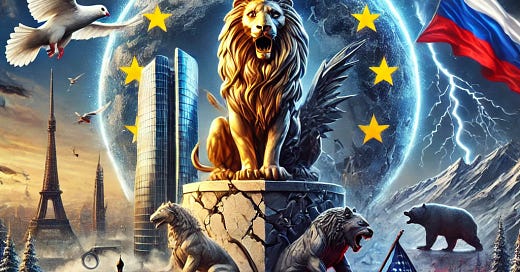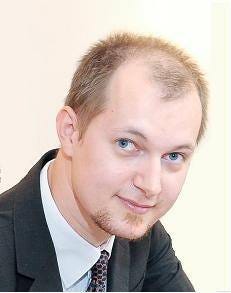Romanian Elections – democracy simulacrum
Short analysis of Romanian Presidential elections 2025
de Florin Platon
It is said that empires and politycal systems test and begin their transformations from the outskirts. And Romania is such a place, among others, on the eastern borders of European Union. It is not just a geographical border, it is a civilizational one, as Samule Huntington was pointing it too, in his ‘Clash of Civilizations’. And now, with the Ukrainian conflict, this tectonic clash is brought back to life, on the EU outskirts, reenactments of old conflicts, fought over again. This is the political clash of the Romanian Presidential Elections that are taking place this Sunday.
The Ukrainian conflict, unfolding just on the Romanian border, throws a cold shiver among the Romanian citizens. In some places, close to the eastern frontier, there’s been even foreign drones dropped from the sky. Fighter airplanes training daily above towns have become a norm and a constant reminder of the conflict just across the border. The spectre of war is not merely a calamnity, but a political endeavor of Romania’s European allies and partners.
As we celebrated the defeat of Nazist Germany and its allies, on May 9th, 80 years since the end of Second World War, Germany is again leading a western military alliance for a war in the East. And pressures are made for Romanian citizens and politicians to report for duty in this conflict too, as an act of fealty and loyalty to its European membership. To speak against it, one is immediately called a ‘Putinist’, an enemy of the state, and anti-european. Just before the first round of presidential elections, last year, 2 candidates have been disqualified for these precise acussations, without any judicial court process. Even more, when an unexpected candidate, Calin Georgescu, won the first round of elections, with a discourse against the involvement of Romania in the war, elections been suspended, with the accusations that the winner is an agent of Russia. There’ve been no proofs presented yet, and strangely enough, no judicial case against the candidate on these accusations.
Romanians have a dire recollection of its Western partners in the WW2, especially Germany, that as an ally, sold Romanian territories piece by piece, to Hungary, Bulgaria and even to the Soviet Russia, until finally forcing Romania to enter the war too. And there’s a strange similarity between the political climate before the entry of Romania in the war then, on the side of the fascist Germany, and now, on the side of a renewed western military alliance around the same Germany. Both candidates in the Sunday elections are either openly commited to supporting the European war politics in Ukraine, or for supporting it under certain conditions[1] (like respecting the rights of the Romanian minority from Ukraine), a change in positioning compared to the disqualified Calin Georgescu, leaving Romanians with no certainty about their future of either war or peace, voting for any of the candidates. And this was the exact political scene in Romania, right before the start of World War 2, with Germany supporting two opposing political contenders, which were both fascists and commited to the Nazist Germany thrust to war and the holocaust against Jews.
The Nationalist Simulacrum
For a country that is one of the poorest in European Union, and with the greatest social inequalities, the probability to develop political movements of revolt against present political status quo, is extremely high. During the ’90, nationalist parties like ‘Romania Mare’ (Great Romania) were strong enough to contest for presidency, like in the 2000 elections. The other possible challenge to the political status quo, the leftist parties, been consistently pressured and absorbed by the main social-democrat party (PSD), the dominant political party since 1989.
When finally the ‘Great Romania’ nationalist party been politically dismantled, all the revolted electoral masses became a loose political risk, wavering from one party to another, unexpectedly. Just like the meteorick and totally unpredicted rise of Calin Georgescu. Other such nationalistic surprises are ‘SOS’ Party, who entered the Parliament and won seats in the European Parliament, or the ‘POT’ (Party of the Young People).
But not everybody was caught unprepaired. For one of the Romanian Secret Services, SRI, through one of its chiefs, general Anton Rog, head of National Cyberint Center, came publicaly bragging how they control the public opinion and decisions through ‘social engeneering’[2]. And even more, how their interference applies to political parties and elections too[3]. Such a declaration was so troubling, that it raised public critics, including from political parties[4]. This involvement of the secret services would also raise the questions, how that there are ‘bad nationalists’, like Calin Georgescu, and ‘good nationalists’ with the mandate to run in elections, where others are prevented? And to sum it up, the very institution that prevented Calin Georgescu, cancelling the popular vote for him, was exactly a decision of the Secret Services.
With war preparations of the European military alliance coming ever closer, and engulfing all in their war effort, the Romanian elections are too important to be left to the hazard of the popular vote.
[1] https://www.euronews.com/my-europe/2025/05/09/our-position-is-very-clear-its-a-russian-war-against-ukraine-says-simion
[2] https://inpolitics.ro/halucinant-sri-se-lauda-cu-un-departament-care-poate-convinge-oamenii-sa-actioneze-impotriva-vointei-lor_1855468630.html
[4] https://partidulaur.ro/mircia-chelaru-aur-ii-cere-generalului-sri-anton-rog-sa-isi-rafistoleze-declaratia-institutiile-de-informatii-trebuie-sa-ramana-neutre-politic/
Un profesionist în comunicare politică, activist politic şi suporter al Stângii Europene, al forţelor progresiste şi de stânga din Europa. Fondator al Diem 25 România




